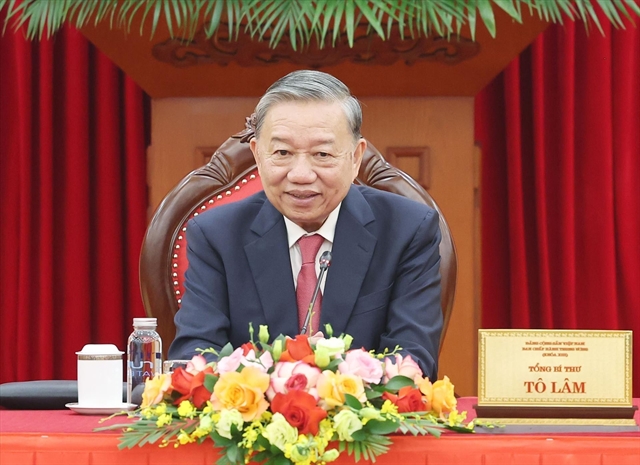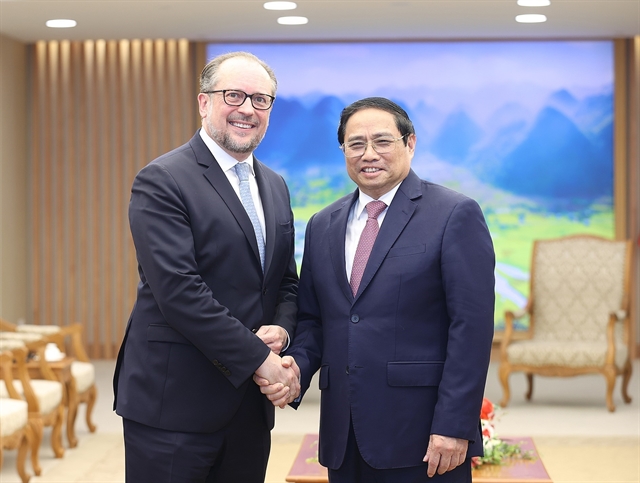 Politics & Law
Politics & Law

 |
| Prime Minister Phạm Minh Chính met with Austrian Federal Minister for European and International Affairs Alexander Schallenberg in Hà Nội on Monday. — VNA/VNS Photo Dương Giang |
HÀ NỘI — Prime Minister Phạm Minh Chính welcomed the first visit to Việt Nam by Austrian Federal Minister for European and International Affairs Alexander Schallenberg during a reception for the latter in Hà Nội on Monday.
PM Chính hailed the outcomes of the earlier talks between Schallenberg and Vietnamese Minister of Foreign Affairs Bùi Thanh Sơn, as well as a Việt Nam-Austria cooperation forum with the participation of the two countries’ businesses the same day.
In its foreign policy of independence, self-reliance, diversification and multilateralisation of external ties, active and proactive global integration in a comprehensive and extensive manner, Việt Nam always valued and wanted to reinforce cooperative ties with Austria, an important partner of the European Union, he said.
Schallenberg affirmed that the Austrian Government always considered Vietnam a prioritised partner in the region and looks to expand cooperation with the Southeast Asian country in various areas.
The PM thanked the Austrian Government and people for providing invaluable support for Việt Nam in the process of national development and the past fight against COVID-19. He suggested both sides facilitate the exchange of delegations at all levels, especially those at high level to raise mutual trust and mutual understanding, creating a driving force for all-around collaboration.
Hailing Austria as one of the top 10 trading partners of Việt Nam in Europe over the past years, the PM believed that the two countries' businesses would continue working closely together and tapping advantages brought about by the EU-Việt Nam Free Trade Agreement (EVFTA) to lift two-way trade to US$4 billion in the coming years.
He wished that Austria would create favourable conditions for Việt Nam’s products such as electronics, apparel, leather and footwear, agricultural and aquatic products to access the Austrian and EU markets.
On the occasion, PM Chính proposed the Austrian Government voice its support and call on the Austrian legislature to promptly ratify the EU-Việt Nam Investment Protection Agreement (EVIPA) and support the European Commission (EC)’s early removal of yellow card warning against Vietnamese seafood.
The Vietnamese leader underlined the need to step up bilateral cooperation in areas that both sides have strength and demand, such as sci-tech, infrastructure, labour, vocational training, digital transformation, circular economy and green transition. The two countries hold great potential to expand cooperation in cultural, art and music exchange, and tourism.
He expressed his wish that the Austrian Government would continue offering all possible support to the Vietnamese community living and working in Austria, thereby contributing to the prosperity of Austria and acting as a bridge to propel the bilateral cooperation.
Schallenberg, for his part, said Austria would like to further deepen its ties with Việt Nam in all spheres, adding that the Austrian Government and business community are interested in practical and effective cooperation with Vietnamese partners.
He agreed that both sides should step up labour cooperation by considering the signing of cooperation agreements between the two governments, carrying out training projects between universities and on-the-job training at Austrian companies in Việt Nam, as well as developing the labour market which has great potential.
The two sides vowed to support each other at multilateral and regional forums. Regarding the South China Sea (known in Việt Nam as the East Sea) issue, they shared their views on the importance of ensuring security, safety and freedom of navigation and overflight in the South China Sea, as well as settling disputes through peaceful measures in accordance with international law, especially the 1982 United Nations Convention on the Law of the Sea (UNCLOS). — VNS